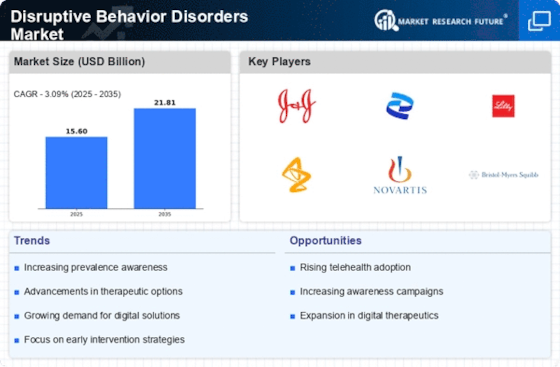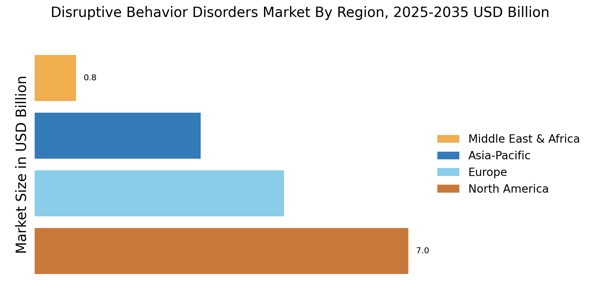Advancements in Treatment Modalities
Innovations in treatment modalities for disruptive behavior disorders are significantly influencing the Disruptive Behavior Disorders Market. The introduction of novel pharmacological agents, such as atypical antipsychotics and mood stabilizers, has expanded the therapeutic arsenal available to clinicians. Additionally, behavioral therapies, including cognitive-behavioral therapy and parent management training, have shown promising results in managing symptoms. The integration of technology, such as telehealth services, has also emerged as a viable option for delivering care, particularly in underserved areas. These advancements not only improve treatment outcomes but also enhance patient adherence, thereby driving market growth. As the efficacy of these new modalities becomes more evident, the market is likely to witness an influx of investment aimed at further research and development.
Increased Focus on Early Intervention
The emphasis on early intervention strategies for disruptive behavior disorders is becoming increasingly pronounced within the Disruptive Behavior Disorders Market. Research suggests that early identification and treatment can significantly alter the trajectory of these disorders, leading to improved long-term outcomes. Educational institutions and healthcare providers are increasingly collaborating to implement screening programs aimed at identifying at-risk children. This proactive approach not only addresses the immediate needs of affected individuals but also reduces the societal costs associated with untreated disorders. As a result, the market is likely to experience growth driven by the demand for early intervention programs and associated therapeutic services. The potential for early intervention to mitigate the severity of symptoms may further encourage investment in this area.
Growing Parental and Societal Awareness
The rising awareness among parents and society regarding disruptive behavior disorders is a crucial driver of the Disruptive Behavior Disorders Market. Increased access to information through various media channels has led to a better understanding of these disorders, reducing stigma and encouraging families to seek help. Educational campaigns and community outreach programs are playing a vital role in informing the public about the signs and symptoms of disruptive behavior disorders. This heightened awareness is likely to result in more children being diagnosed and treated, thereby expanding the market. Furthermore, as societal attitudes shift towards recognizing mental health as a priority, the demand for effective interventions and support services is expected to grow, further propelling market dynamics.
Policy and Regulatory Support for Mental Health
The evolving policy landscape surrounding mental health care is significantly impacting the Disruptive Behavior Disorders Market. Governments and regulatory bodies are increasingly recognizing the importance of mental health, leading to the implementation of supportive policies and funding initiatives. These measures aim to enhance access to mental health services, including those for disruptive behavior disorders. For instance, initiatives that promote mental health education in schools and provide resources for families are becoming more common. Such policy support not only facilitates the availability of treatment options but also encourages research and development in this field. As these policies continue to evolve, they are likely to create a more favorable environment for the growth of the market, ultimately benefiting affected individuals and their families.
Rising Prevalence of Disruptive Behavior Disorders
The increasing incidence of disruptive behavior disorders among children and adolescents appears to be a primary driver of the Disruptive Behavior Disorders Market. Recent estimates indicate that approximately 5-10% of children are affected by these disorders, which include oppositional defiant disorder and conduct disorder. This rising prevalence necessitates the development of effective treatment options and interventions, thereby propelling market growth. As awareness of these disorders expands, parents and educators are more likely to seek professional help, further stimulating demand for therapeutic solutions. The growing recognition of the long-term impacts of untreated disruptive behavior disorders on educational and social outcomes also underscores the urgency for effective management strategies, thereby enhancing the market landscape.

















